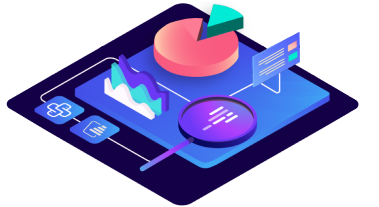Further training as a data analysis specialist

The certificate course Data Analyst - Fundamentals and Expertise for Career Changers enables you to independently perform data analyses in the context of Work 4.0 and Industry 4.0. You will acquire highly sought-after skills in the Python programming language as well as expertise in SQL and machine learning.
Successful completion of the training qualifies you for the job role of (Junior) Data Analyst or another analytical role such as (Junior) Business Intelligence Analyst or (Junior) Financial Analyst. The Data Analyst certification proves your new knowledge and skills and allows you a successful career change.
The target group for the Data Analyst - Fundamentals and Expertise for Career Changers certificate course is clerical staff, office administrators and administrative staff who are unemployed, on short-time working or who are about to lose their job and who would like to have the further training funded with an education voucher from the employment agency or job center. The training is suitable for career changers and the ideal entry into a data-driven job role as a data analyst or business analyst.
This training can only be financed with an education voucher from the employment agency or job center. No programming skills or a university degree are required for the Data Analyst course. You should have a motivation for numbers, logical thinking and a routine in the daily use of computers. You must also have a B2-level knowledge of German and an A2-level knowledge of English.
Introduction - Changing world of work through Industry 4.0
In the first module, you will deal with important basic concepts of digitalization such as Industry 4.0 and Work 4.0. You will learn how Industry 4.0 is changing the world of work and what these changes mean for you. The second chapter of this module deals with the topic of Work 4.0 and provides you with valuable skills for digitalization in the commercial sector. In the final chapter, the topic of Work 4.0 is further specified and you will learn valuable soft skills to master the increasingly digital world of work.
<pChapter 1: Industry 4.0 - How is Industry 4.0 changing the way we work tomorrow and what does it mean for me?
Industry 4.0 is the generic term for the digitalization of the entire production process. The digital networking of machines and processes is a key factor in securing and further developing value creation in all manufacturing sectors. This introductory chapter focuses on the technological foundations. You will take a look at the development history of the system, identify individual technical approaches and place them in an overall context. Regardless of whether you are a manager or a specialist: This will equip you for the challenges that the entire industry is currently facing.
<pChapter 2: Work 4.0 - skills for digitalization in the commercial sector
This chapter helps you to reflect on current and future challenges in the digital world of work so that you can classify specific opportunities and risks. Furthermore, this chapter gives you the skills to independently acquire and expand your expertise in the field of digitalization. This way, you will never lose touch in the rapidly changing world of work 4.0.
<p
Chapter 3: Work 4.0 - Working in new forms of work
In this chapter, you will focus on important issues and soft skills in the world of work 4.0. You will learn how to organize yourself in a fast-paced world and how to work sensibly when topics change frequently. You will also receive tried-and-tested tips on how to create distance from work when working from home to ensure a real end to your working day. This chapter will enable you to expand and manage the potential and strategies of the world of work 4.0 in order to be successful with your personal resources.
Basic knowledge refresher - mathematical and statistical knowledge
In the second module, you will refresh your mathematical and statistical knowledge. This includes the basics of algebra, basic concepts of probability theory, general normal distribution and basic statistical methods
.Chapter 1: Basic mathematical and statistical knowledge
Whether you need to calculate trends for your market research presentation or define the measurement limits of permissible tolerances in quality management: You can't do it without math. Anyone who compiles statistics as part of studies or creates programs to encode data needs mathematics as an indispensable tool. A computer can make the work easier and perform complex calculations, but it cannot generate the underlying formulas. Mathematics is therefore a universal basis for all complex professions, whether in the humanities, engineering, computer science or business. In addition to the basics of algebra from simple to complex topics and their transformation, in this chapter you will deal with statistical methods and distributive calculus.
<pProject management
In the third module, you will familiarize yourself with the basics of project management. This module focuses on project organization, methods, handling and controlling projects, resource management and project evaluation
Chapter 1: Project management basics
Project management is increasingly becoming a success-determining organizational approach for companies in a wide range of industries and sectors. It enables fast and flexible workflows and makes a significant contribution to increasing the effectiveness and efficiency of a modern company. In this chapter, you will learn the theoretical and practical basics of project management in a compact format. You will learn how to use a company's resources dynamically, even across departmental boundaries. The focus is on starting a project, the methodology of project planning and scope and time management. In addition to project implementation, cost management, controlling and team management as well as project completion are also covered.</p
Data skills
In the fourth module, you will acquire basic data and AI skills. With a data-driven mindset, you will understand why data-based decisions are essential and how to implement them successfully with data thinking. You will learn what artificial intelligence can achieve and what is needed for successful AI projects in the company. The module is rounded off with best practices for data storytelling. This will enable you to communicate your data knowledge and data-driven results to your target group.</p
Chapter 1: Data Literacy
You will acquire basic skills to process data profitably in your own company. You will expand your knowledge of the most important data technologies such as big data, artificial intelligence and the Internet of Things. By the end of the chapter, you will have a holistic overview of the entire data processing process and will be able to integrate data into your day-to-day work.
1. big data
You will be introduced to the world of big data. A special focus is placed on the flow of a typical data processing procedure from the generation to the analysis of the data. In this context, you will recognize the added value and relevance of high-quality data in the form of structured data. You will receive rules and guidelines on how to establish and ensure the required data quality.</p
2. datafication
You will acquire the skills to recognize added value and the possibilities of data. You will learn the relevant points when implementing new data infrastructures and acquire knowledge of data visualization to communicate results as clearly and unambiguously as possible.
3. Artificial intelligence
The terms artificial intelligence, machine learning and deep learning will be demystified for you. You will be able to assess what artificial intelligence can already do and what it cannot yet do. By learning technical terms, you will be able to communicate at eye level with employees in the specialist departments for data analysis.</p
4. Internet of Things
You realize that data from sensors also provides important insights. You will also gain an idea of how the networking of devices can lead to the improvement of processes or new value creation opportunities.
Chapter 2: AI Literacy
You will receive a practical introduction to the field of artificial intelligence. You will gain the necessary core skills to confidently understand existing and new AI applications based on various scenarios from everyday business life, to successfully transfer them for your company and to interact with them.
2. Typical applications of AI
You will learn how to apply AI using two typical use cases and how to interact with AI-based systems. This will enable you to generate added value for companies, e.g. by increasing efficiency.</p
3. Advanced applications of AI
You will focus on advanced applications of AI with the help of a practical task on an intelligent industrial robot and take a look into the future of AI with an expert interview.
Chapter 3: Data Driven Management
In the Data Driven Management chapter, you will receive an overview of the most important data roles and valuable recommendations for action from renowned data experts from industry and business. You will round off the chapter with a toolkit for implementing data strategies and building the necessary structures and core competencies in the company with the help of data thinking.
Chapter 4: Data storytelling
In six steps, you will learn the basics of data visualization and the most important techniques for effectively communicating data-driven results and abstract statistical concepts in order to successfully implement a presentation that is appropriate for the target group.
Tools for data analysis and data visualization
In this module, you will learn the basics of relational databases and database models, carry out simple data queries and deepen your SQL knowledge in a project work with a final presentation. In the further course of this module, you will learn the basics of data visualization with Google Data Studio. This includes the theory of data visualization, the theory of models, getting started with Google Data Studio and the implementation of complex data visualization projects.</p
Chapter 1: SQL Basics for Software Developers
SQL is the standard for all database systems and is therefore one of the basic skills required in many areas, including software development. In this chapter, you will gain a theoretical and practical insight into the syntax of SQL and its possible applications. With this course, you will acquire basic knowledge of relational database systems as well as application-ready skills in the use of the database language SQL. In addition to carrying out practical tasks in a practice database, you will also realize a small database project of your own. This will teach you about SQL topics in a practical way, from creating a data structure, executing DML statements and simple queries to some advanced topics such as stored procedures.
> Introduction:
- Basics of database architectures
- Introduction to MySQL and MariaDB
- Methods for database design
> Relational data models:
- Creating a database
- Creating and managing tables
- Use of suitable data types
- Inserting, updating and deleting data (DML)
> Simple database queries:
- Operators in WHERE clauses
- ORDER BY and GROUP BY
- Application of stand functions
- Data queries across multiple tables using joins
> Advanced topics:
- Primary and secondary keys
- Foreign keys
- Stored procedures and stored functions indexes
> Project work with final presentation
Chapter 2: Data visualization with Google Data Studio
Data visualization is the key to analyzing and evaluating complex data. In today's business world, more and more data is being generated and compiled in less and less time in order to derive benefits, generate a basis for decision-making or create competitive advantages. The different formats and storage forms of this data are often the first hurdles. Once you have succeeded in making this data available in the same formats, you are faced with the challenge of the relationships and scalability of such data. Who should use it and what insights can be gained from the data sets? How does the type of presentation influence the interpretation of the data? You need more than a simple standard Excel chart. In this course, you will learn the fundamental theoretical principles of data visualization and gain initial practice with powerful tools to master complex data visualization projects.</p
> Theory of data visualization
- Correlation, relation, dimension, dynamics, trend
- Differentiation
- Visualization forms 2D and 3D
- Complex comparisons in different dimensions
> Theory of the models
- Target groups
- Psychology and perception
- Expectation, interpretation, responsibility
> Google Data Studio
> Complex data visualization projects
- Formulating objectives, questions and target groups
- Analyze and provide data pools
- Preparing and presenting data
- Evaluation phases
Data analyst with communication and presentation techniques
In the sixth module, you will learn how to independently clean, process and visualize data and make business-relevant predictions. You will acquire highly sought-after skills in the programming language Python and in the field of machine learning
Chapter 1: Python Beginners Guide
You will familiarize yourself with the interactive learning environment - StackFuel's Data Lab - and the Python programming language
Chapter 2: Data Analytics with Python
You will learn how to access, filter and merge new data sources. You will practise making company data accessible to target groups with appealing visualizations and independently carrying out classic data processing procedures (importing, filtering, cleaning, processing and visualizing data).
Chapter 3: Machine Learning Basics
You will create data science workflows with sklearn, evaluate your model performance using suitable metrics and become aware of the problem of overfitting.
Communication and presentation
In the additional module, you will learn many helpful methods and tricks for communicating and presenting content to your target group. The focus is on teaching you new skills in visualizing, presenting and moderating. We will also show you how to follow up moderations and presentations in the best possible way.
Chapter 1: Skillful moderation - creative presentation
Moderating and presenting are everyday professional tasks that can often be more complicated than expected. What works in one situation can go wrong in the next. That's why you'll learn how to professionally prepare and deliver presentations that are tailored to your target group and situation in this additional chapter.
Module overview





StackFuel GmbH
Nostitzstrasse 20
10961 Berlin
info@stackfuel.com
030 / 544 533 420
Solutions
Company
Resources
Contact